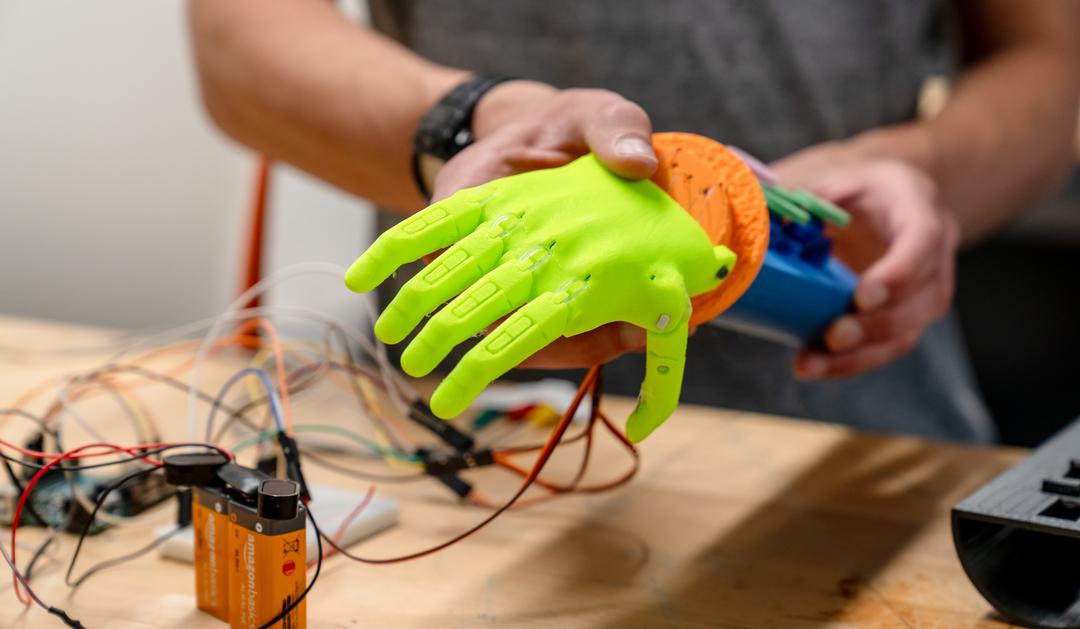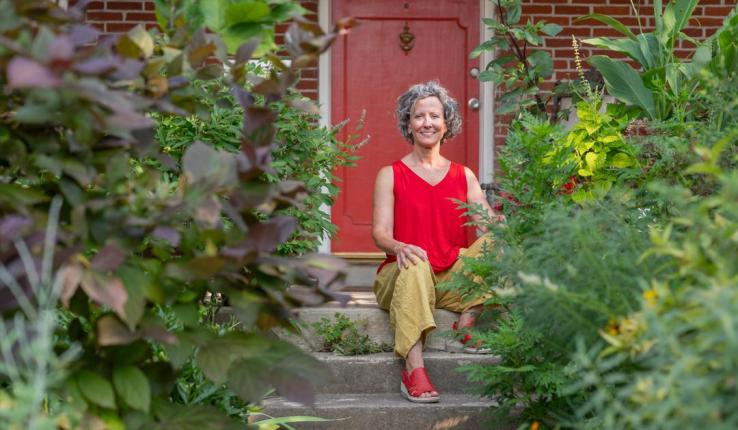Using the three-dimensional (3D) printers and other equipment in Wilbur Powerhouse, a group of students who belong to Lehigh’s chapter of the online global group Enabling the Future (LU e-Nable) is developing a prototype for an externally powered, upper limb prosthesis as part of a collaboration with a Spanish nongovernmental organization.
The Lehigh students are working with Ayúdame3D, which designs, manufactures and provides low-cost, body-powered prosthetic arms, free of charge, to those in need around the world. The aim is to expand options for the NGO and its 3D network by developing a prosthetic that can improve functionality and be produced at a much lower cost than currently possible.
“This is important because there are a lot of people in low-income countries and in developing countries and in conflict areas where prosthetics are needed,” said Tomas Gonzalez-Fernandez, assistant professor of bioengineering, who co-advises the Lehigh group. “They are also expensive and people cannot access them for their upper limbs.”
Ayúdame3D identifies patients who need prosthetics and then 3D-prints them to the patients’ specifications, Gonzalez-Fernandez said. However, since the prosthetics are usually mechanical, he said, that can pose problems for some patients—such as those with an amputation closer to the shoulder—who do not have the muscles to move the prosthetics.
“We are helping the NGO to incorporate some muscle sensors and electronics into the prosthetics, so the prosthetics are actioned not only by the mechanical movement of the arm, but also through the sensing of the movement of the muscles,” he said.
Zachary Weiser ’25, who was co-president of the Lehigh chapter with Sean Fleming ’25 this past academic year, said Lehigh students plan to test their design and refine it during the 2024-2025 academic year. They will seek feedback from staff and patients at Good Shepherd Rehabilitation in Center Valley, Pennsylvania, and have already met with a doctor there.
“This past year, we got pretty close to our basic design,” Weiser said. “And so you have all the components and they fit into what we want, and they move the way that we want but we just want to make sure that they're doing that consistently and look the best they possibly can. I'm sure we'll find different areas that we want to tweak. That process will take a little while.”
The Lehigh chapter was active prior to the pandemic, but needed to rebuild after students were able to return to campus in person. Susan Perry, assistant dean of academic affairs for the P.C. Rossin College of Engineering, is also co-advisor.
For a while after regrouping, Weiser said, the chapter did smaller projects of learning, such as how to prototype.
What happened next was somewhat serendipitous. Weiser had taken a bioengineering class with Gonzalez-Fernandez, and as he became more involved with LU e-Nable, he asked his professor whether he knew of anyone who had lost a limb and would be in need of a prosthetic. Shortly after, Gonzalez-Fernandez connected with one of his best friends at a wedding in Spain. The friend had been collaborating with Ayúdame3D, which had 3D-printed small gifts for the wedding attendees. Gonzalez-Fernandez was interested to learn more.
“It would be incredible,” he told his friend, “if I could make contact with the NGO, and then put the club here at Lehigh in contact with the NGO so that they can work together.”
What followed led to LU e-Nable’s current collaboration with Ayúdame3D. Gonzalez-Fernandez said the collaboration aligns with Lehigh’s new strategic plan, as it provides Lehigh students with experiential learning and allows them to apply concepts they are learning in the classroom. It also applies “Universal Design for Inquiry” by innovating the classroom experience and personalizing education for each student.
“This is really important for students to realize that what they learn in class has a real impact that can help a lot of people,” Gonzalez-Fernandez said.
Weiser said about 30 students overall are part of the chapter, but usually about 10 to 15 students participated week to week to work on design and electronics. He noted that the chapter is open to all students at Lehigh, regardless of major, and that organizers are able to teach the software and other matters to fellow students.





